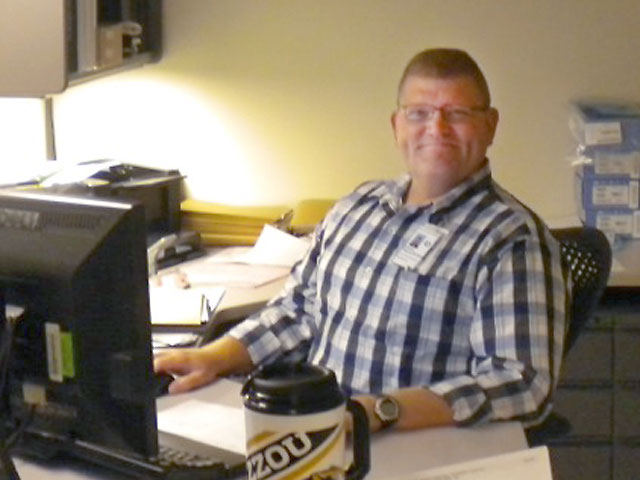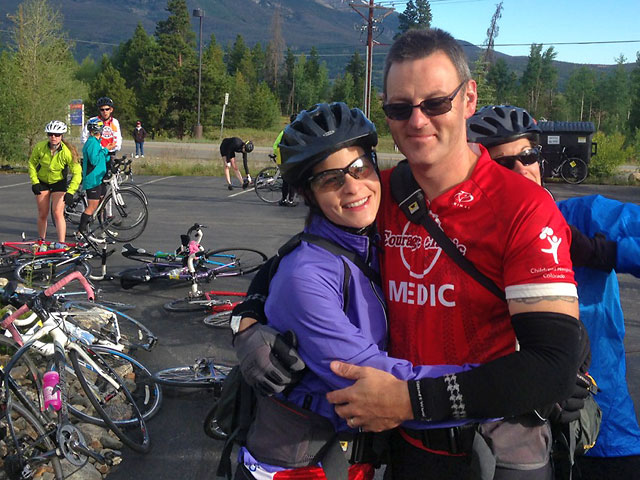We all know respiratory therapists who have left the profession for one reason or another. Most of them settle into their new careers just fine (or move on again, looking for those ever-greener pastures). But sometimes RTs who left want to come back. Is that realistic in a fast-moving field like ours? Two AARC members who did it show the answer is yes.

Jimmie Riggins is enjoying the chance to work with patients again.
To sales and back
Jimmie Riggins, BHS, RRT-NPS, first got into the profession back in the late ‘80s after completing training as an EMT. He was in the Army Reserves at the time and says that, “One day, after the realization that while emergency medicine would be fun, it does not pay that well, I asked my First Sargent what he did for a living.”
That First Sargent was an RT. Riggins liked what he heard about the profession and decided to go for it. “At the time there was a 12 month certification program here in Columbia, MO, and I completed this in December of 1987.”
Riggins went on to work as a CRT at various hospitals, eventually earning a BHS degree and his RRT credential as well. He worked his way up to supervisor and then manager of a respiratory care department. Eventually, opportunity knocked and he left to go into medical sales, a career he pursued for about seven years until the travel required by the job got to him and he started thinking seriously about going back to the hospital setting.
Like a lot of returning RTs, he had to do some backtracking to make that possible. “I let my respiratory care license expire and had to go through the process to get that back,” he says now. He also had to face the many changes that had occurred since he left the field. But it all worked out in the end. He started as a staff therapist at Harry S. Truman Memorial Veterans Medical Center in Columbia in December of 2010 and has since moved up the ranks to lead RT and now supervisor of the respiratory care service.
Riggins has this advice for RTs who have left the field and may be thinking about coming back—
Hopefully you did not let your state license to practice respiratory care expire. It is much more difficult to get it back than it is to keep it current. If you have left the medical field entirely for any length of time, be prepared, our wonderful profession has changed greatly in just the last ten years. Ventilators are much more sophisticated, patient centered care drives what we do, and even the routine of routine therapy has changed with the addition of the Affordable Care Act and the requirements it has. But don’t despair, the skills you had when you left will get you back up and running very quickly. Respiratory therapists are problem solvers, from taking a pile of spare parts/adapters and making something out of nothing, to quickly understanding any new ventilator that a medical center may have. We always figure it out.

Justin Misuraca, seen here with wife Liz at an annual Children’s Hospital fundraiser, uses his personal experience with tragedy to help the parents of his young patients.
Family tragedy requires a break
Justin Misuraca, RRT-NPS, C-NPT, EMT-B, was just four years into his career when he decided to walk away in 2001. In his case, the decision was more emotional than anything else.
“I was working as a neonatal/pediatric RT in a hospital that did high-risk deliveries,” he explains. His wife was pregnant with their first child, and the baby ended up being born early at just 24 weeks. Misuraca and his wife lost the child, and the couple was understandably devastated.
When he returned to work, his first delivery was a 24 week premature baby who also didn’t survive. He decided he needed a break from respiratory care and left to start a remodeling business that he still runs on the side today.
His decision to return to the profession was a practical one. “I decided to come back to respiratory when my wife became pregnant with my daughter,” he says. “She needed to go on bed rest and I needed to get good medical insurance.” Since he had only been gone a few years, coming back wasn’t that difficult from a technical standpoint, and as he got back into the job he found much of the emotional turmoil had resolved as well and he was actually able to take solace in being able to help those who found themselves in situations like his.
“I found peace with the passing of our son,” says the therapist. “It still is difficult when I see a 24 week baby pass away, but it is not so much the baby dying as it is the parents’ loss that bothers me. I can understand some of their feelings, and I am also able to tell them that things are horrible now but they will get better.”
Misuraca, who now serves on the air medical transport team at Children’s Hospital Colorado in Denver, says his advice for RTs who are thinking about returning to the profession is short and sweet—
My suggestions for people coming back into the career field are simple. Start off slow. Get a good orientation and work hard at gaining the knowledge you need to care for your patients.
Stay tuned to Career News for a follow up article on the manager’s perspective on returning RT applicants.
